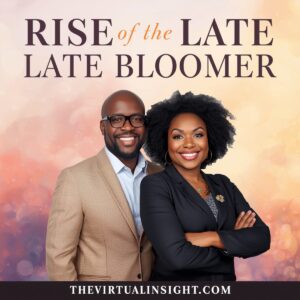Financial feminism is not a buzzword. It’s a movement. A powerful shift in how women relate to money, power, and independence. It’s about creating equity. It challenges the systems that have historically excluded women from financial spaces and pushes back against outdated ideas that money is “a man’s thing.”
It’s about more than equal pay. It’s about owning land. Starting businesses. Investing in stocks. Talking about money openly. Creating generational wealth not just surviving until the next pay cheque. It’s the difference between budgeting out of fear and building with confidence.
Growing up, most females don’t get talked to about owning property, investing in stocks, or planning for retirement. We are taught to be careful with money but not to grow it. I knew how to save. I knew how to stretch. But investing? That felt like something meant for “big men in suits.” Even now, many women still feel like financial literacy is something they have to earn, like a permission slip they’re waiting for.
But we’re not waiting anymore.
The Shift from Scarcity to Strategy
There’s a quiet revolution happening. More women are shifting their mindset from scarcity to strategy, where wealth is something to plan, grow, and protect.
Instead of obsessing over how to spend less, more of us are thinking in terms of how to earn more. And not just earn, but multiply. This includes learning how to make money work for us through smart investments, passive income, and asset ownership. It’s about making deliberate financial decisions that align with our long-term goals, not just our current obligations.
The goal has shifted from managing lack to building abundance and that changes a whole lot of things. We’re done with being only the savers and supporters. We’re becoming strategists, investors, and wealth builders.
Why This Matters More Than Ever
The gender wealth gap is real, and it’s wider than the gender pay gap. Even when women earn the same income as men, they tend to hold significantly less wealth. That’s because wealth isn’t just about income, it’s about what you do with it.
Historically, women were excluded from owning property, taking out loans without a male co-signer, or even having their own bank accounts. These restrictions may have been lifted legally, but their legacy lingers in our financial habits, societal norms, and confidence around money.
Women are also more likely to take time off work for caregiving, face higher medical costs, and live longer. These are factors that make financial independence even more critical. Financial feminism addresses all of these realities, advocating for systems that support women and for women who support themselves.
In places like Nigeria, these issues intersect with cultural expectations. Many women still feel pressure to prioritise family needs over personal financial growth or to let a husband or brother handle money matters. But that’s changing.

The New Faces of Financial Feminism
Owning Assets, Not Just Buying Things
The conversation is shifting from consumption to ownership. It’s not about how many nice things you have; it’s about what you actually own that appreciates in value.
Women are now:
- Buying land and property: Not just building homes to live in, but investing in rental units, farmland, or commercial plots that generate steady income.
- Starting real businesses: Not just side hustles, but scalable businesses with structure, vision, and longevity.
- Pooling resources with friends or family: Women are forming savings circles, co-investment groups, and cooperatives to purchase assets together. This collective model allows them to do more than they could alone.
- Choosing value over status: Instead of buying luxury items for validation, women are focusing on assets that grow. That might mean shares in a growing startup, real estate, or equity in a business.
From Savings to Investment
For too long, women have been told to save. Save for emergencies. Save for marriage. Save for children. Saving is important, but it’s not enough.
Now, women are:
- Opening investment accounts: Platforms like Bamboo, Risevest, Chaka, PiggyVest and Trove are making it easier than ever to start investing with as little as $1. These tools demystify the process and make investing accessible.
- Understanding risk vs. reward: Rather than fearing risk, women are learning how to assess it. They’re realising that leaving money in a savings account with 4% annual interest is actually losing value when inflation is 20%.
- Diversifying portfolios: Women are exploring stocks, mutual funds, dollar-denominated investments, ETFs, bonds, and even agriculture-backed investments.
- Learning through community: Online forums, WhatsApp groups, and Instagram Live sessions are allowing women to ask questions, share wins, and discuss setbacks.
Female-Focused Financial Spaces
Women are carving out their own learning spaces. Spaces where they can ask questions without feeling judged or overlooked. These communities are safe, relatable, and practical.
Some examples include:
- HerVest: A Nigerian fintech platform focused on improving African women’s access to inclusive finance. HerVest offers impact investing opportunities in agriculture, savings products, and financial literacy programs tailored for women. What makes HerVest unique is its focus on underserved women in rural and peri-urban communities, bridging the gap between financial inclusion and real economic empowerment.
- FinTribe: A growing digital community built specifically for African women who want to take control of their finances without shame or confusion. FinTribe offers goal-based savings tools, money challenges, and real-talk conversations about debt, income streams, and lifestyle planning. What makes it powerful is its focus on community-first accountability. It’s not just about using an app, it’s about learning from other women who are walking the same journey.
- Money Africa: A platform that educates and empowers Africans, especially women, to take charge of their personal finances.
- Investment clubs: Informal or semi-formal groups of women who contribute monthly and invest collectively in real estate, stocks, or small businesses.
These communities help women unlearn limiting beliefs and replace them with actionable knowledge.
Building Generational Wealth
Generational wealth isn’t just about passing down cash. It’s about building a financial foundation that outlives you. It means giving the next generation options, resources, and knowledge.
This could include:
- Property ownership: Having land or housing that can be rented out, sold, or passed down.
- Investments: A well-diversified portfolio that continues to grow even when you’re gone.
- Life insurance: A financial cushion for your family if something happens to you.
- Financial documentation and planning: Keeping detailed records of your assets, debts, and investment strategies. Creating wills, setting up trusts, and designating beneficiaries.
- Financial education: Teaching children how money works, from budgeting to investing, so they’re not starting from scratch.
There Are Still Barriers
Financial feminism is powerful, but it’s not without resistance. Many women are still navigating:
- Cultural expectations: Women are often told that focusing on money is selfish, unfeminine, or unattractive. There’s still pressure to depend on male partners or to channel all resources into family obligations.
- Confidence gaps: Some women doubt their ability to handle money, especially investing. This isn’t because they’re incapable; it’s the result of years of being left out of financial conversations.
- Limited access to capital: Women entrepreneurs still struggle to get funding, loans, or credit compared to male counterparts.
- Guilt around ambition: There’s a lingering belief that wanting more (more money, more freedom, more success) makes you greedy. Financial feminism says the opposite: ambition is not selfish; it’s necessary.
So Where Do You Start?
You don’t need a finance degree or millions in the bank to start building wealth. What you need is clarity, consistency, and community. Here are five actionable steps to begin:
Track your income and spending
Start by getting honest with yourself. Where does your money go each month? Use an app or notebook to record every naira in and out. You can’t manage what you don’t measure. This helps you identify leaks, waste, or even patterns you didn’t notice like emotional spending or recurring subscriptions you forgot about.
Learn the basics of investing
Choose one topic a week and dive in. YouTube channels, podcasts, and platforms like Money Africa simplify concepts like mutual funds, risk management, and compound interest. Start with small amounts on apps like Risevest or Trove. As you grow your confidence, increase your commitment.
Choose ownership over appearance
Ask yourself: will this purchase still have value next year? Think long-term. Would you rather have a flashy phone or a piece of land? A new dress or shares in a company that pays dividends? Start shifting your spending habits from short-term gratification to long-term stability.
Talk about money with other women
Money talk shouldn’t be taboo. Create or join a money circle. Be honest about wins and struggles. Share tips, tools, and resources. This breaks the silence and shame around finances, and builds powerful accountability.
Set a wealth intention
Write down your money goals and put them where you can see them. Whether it’s buying land, paying off debt, or retiring early, be specific. Then build a plan to get there. Review your intention monthly and adjust as needed.
Financial Feminism Is the New Self-Care
This isn’t about becoming obsessed with money. It’s about reclaiming your right to financial freedom and using money as a tool not a chain. When you have money, you have choices. You can leave a toxic job, say no to disrespect, support causes you care about, or simply rest without guilt.
The more women who understand and embrace financial power, the more we shift the narrative not just for ourselves, but for the girls coming behind us.
Financial feminism is not a trend. It’s a revolution. Become part of it.
Stay frosty.





Keep working ,fantastic job!
Thank you.